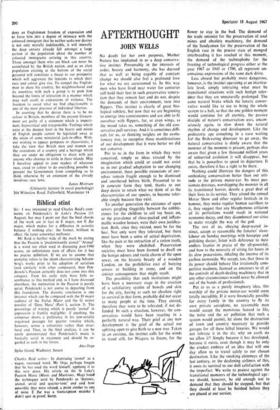Biblical stint
Sir: I was interested to read Charles Reid's com- ments on Penderecki's St Luke's Passion (I August). but may I point out that the final chords of the work are in fact in E major, not E flat major, which makes for a difference in acoustic balance if nothing else: the former, brilliant in effect, the latter somewhat mellower.
Mr Reid is further wide of the mark by stating that the Passion is 'predominantly atonal.' Atonar is a word too often used in discussing post-1900 scores, an unfortunate state of affairs for it has no precise definition. If we are to assume that atonality refers to the idiom characterising Schoen- berg's works prior to his adoption of serialism (and similarly with other composers), then Pen- derecki's Passion certainly does not come into this category. Even his early style bore little re- semblance to this method and, as I have discussed elsewhere, the motivation in the Passion is purely serial. Penderecki is not averse to departing from this foundation. The diatonic conclusion is one instance which can be compared with the D major cadence of the Stabat Mater and the G minor tonality of `Deus Meus' (Part I, section 3). The percentage of writing which is purely 'atonal' in expression is frankly negligible: if anything, the composer shows a preference in his non-serially organised passages for quarter tonality which, however, serves a colouristic rather than struc- tural end. Thus, in the final analysis, it can be easily demonstrated that Penderecki's music is basically serial in treatment and should be re- garded as such in the future.
Charles Reid writes : In dismissing `atonal' as a vague. overused word, Mr Orga perhaps forgets that he has used the word himself, applying it to this very piece. His article on the St Luke's Passion Music (Music and Musicians, May) 'fisted the techniques used by Penderecki as `diatonic, atonal, serial and quarter-tone' and said how smoothly they were related, a point similar to one of mine. E flat was a transcription mistake I didn't spot in proof. Sorry.






























 Previous page
Previous page